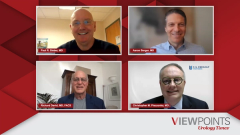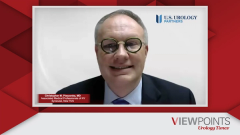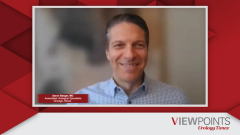
Closing Thoughts on Urology Practice Management and Treatment of Advanced Prostate Cancer
Closing out their discussion on how treatment and management of advanced prostate cancer affects their clinical practice, expert urologists consider how the therapeutic landscape continues to evolve and look toward future evolutions in care.
Episodes in this series

Transcript:
Paul R. Sieber, MD: Our topic today was basically talking about advanced prostate cancer and managing all the pitfalls and some of the things we’re doing these days. So, I was asked to get a brief conclusion form everybody. So, I’ll start west and work east. So, Richard, I’ll go with you first and say, any last comments that you’d like to make about what we talked about today?
Richard David, MD, FACS: Well, Paul, I think you know that this has been valuable for us and hopefully for the people who are watching this. I think it’s interesting for us to think about a therapy that we’ve been giving for so many years and all the nuances that have come along as these therapies have evolved and our practices have evolved. And I think it’s good for us to chat about all that stuff. So, I’m grateful that you did all this.
Paul R. Sieber, MD: Aaron, we’ll move back to the middle of the country.
Aaron Berger, MD: Thank you. Yeah, I think it’s been a great discussion. Certainly, I think moving forward, ease of workflow, consistency of workflow, having products that are easy to teach, easy to administer, and keeping all our new staff, keeping it simple for them...are really what’s going to be key, obviously with good clinical effectiveness. But I think as Chris mentioned earlier, this is moving forward with...some new indications coming for even biochemically recurrent cancer, where we’re going to be using other drugs beside just ADT [androgen-deprivation therapy] monotherapy. The number of patients who are just getting injections every 6 months and...checking in for their PSA [prostate-specific antigen level] and that’s it—those numbers are going to be decreasing every year, it seems, with some new indications coming. So, it is going to be up to those of us [who] do a lot more advanced prostate cancer and are used to managing these patients to really make sure that they’re being managed properly with the new indications coming, because it’s not just going to be the ADT monotherapy we’ve had for a long time.
But certainly APPs [advanced practice providers], I think you mentioned APPs, we’ve really brought a lot of them in. I think just for those patients who are potentially in outlying areas or harder to get to the office, if they are on ADT monotherapy, it’s certainly not a bad place for them to see an advanced practice provider and manage their ADT monotherapy, although those patients are going to be probably dwindling.... I think the APPs in general do spend more time with the patients. They’re a little more involved in making sure their quality-of-life issues are addressed and all those...things than some of the physicians who are trying to squeeze in 50 or 60 patients a day. So, it may be a good place for them to be more involved to really give them that time that they need to go over any problems that we busy, crazy people running around from room to room may not have the time to spend with them.
Paul R. Sieber, MD: Chris?
Christopher M. Pieczonka, MD: I agree with everything that’s been said so far. I think that as an organization, we’ve embraced advanced prostate cancer because it’s growing. We don’t have a growing population locally. There are only...so many people [who] get operated or radiated in the prostate cancer world. And these people with advanced prostate cancer are living longer. And as a consequence for that, the pool that we have [is] just...bubbling up. So, efficiency is really important for us on that. I think the other thing is that the paradigm shift that we’ve done as an organization is to actually realize that from a business standpoint...the income comes on the backend, not for the professional services of seeing the patients. And so, we’ve had to change our compensation model a bit to reflect that both on the physician side and the advanced practice provider side to realize that this is an important part of our business and how do we...have that be supported because of the revenue that comes in from both the injectable therapy and the in-office dispensary.
Paul R. Sieber, MD: Well, I want to thank everybody. I think it’s interesting when we talk about ADT, just talking about getting the right ADT product is a challenge. And even as I gave a talk to, actually, Chris’s group last night for grand rounds about managing ADT in general becoming more complex, whether you’re saying, Which product do I pick to talking about how do I...intensify or deintensify therapy? Have I taken the guy’s cardiac history? Have I addressed his bone health? Am I looking at even his genomic history to figure out what’s going on? So, it’s becoming a more complex topic and I think it’s been helpful for all of us— since I said I know everybody on the call today—it’s been nice to have everybody on the call that I do know, and I think it’s...a tribute to our organizations in terms of LUGPA [Large Urology Group Practice Association] and UroGPO to getting us all together to have these discussions. And I hope everyone finds the discussion among all of us helpful because I find my discussion with all these guys helpful in my daily routine about figuring out what I want to do. And I think it’s becoming more complex, and I think it’s nice that we’re...banding together as urologists to share our experiences across the country. And I thank everybody for sharing their experience today. Thank you everybody.
Christopher M. Pieczonka, MD: Thanks so much.
Transcript is AI-generated and edited for clarity and readability.
Newsletter
Stay current with the latest urology news and practice-changing insights — sign up now for the essential updates every urologist needs.










